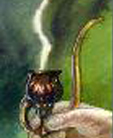FigwitBook Club Moderator & Misty Mountain MonsterPosts: 1966 Send Message |
|
atalante_starScholar of Imladris and Theodens LadyPosts: 1365 Send Message |
|
FigwitBook Club Moderator & Misty Mountain MonsterPosts: 1966 Send Message |
|
| RubySandybanks |
|
| RubySandybanks |
|
FigwitBook Club Moderator & Misty Mountain MonsterPosts: 1966 Send Message |
|
| RubySandybanks |
|
| LadyEowyn_Of_Rohan |
|
| RubySandybanks |
|
|
|
| RubySandybanks |
|
|
|
| RubySandybanks |
|
|
|
FigwitBook Club Moderator & Misty Mountain MonsterPosts: 1966 Send Message |
|
| LadyEowyn_Of_Rohan |
|
FigwitBook Club Moderator & Misty Mountain MonsterPosts: 1966 Send Message |
|
| Lieutenant_Gothmog |
|
 Author
Author








 5.IV. The Siege of Gondor
5.IV. The Siege of Gondor !
!
 The fighting spirits of the men of Gondor and those who are aiding them are tested from the beginning. The cries of the Fell Riders are paralysing and terrible. “…piercing the heart with poisonous despair.” A taste of more to come. As readers, we barely have time to breathe. A bit later, “…a faint cry (of the winged Shadows) would come, and many who heard it would stand stricken with a passing dread, while the less stouthearted quailed and wept.” There are brief moments of hope: Gandalf driving off the Nazgûl by emitting a shaft of white light from his raised hand. A ray of hope against the hammer of despair. Faramir is saved. Later Gandalf raises his hand again to drive off the Nazgûl thus rescuing Faramir, among others, from certain death. The siege itself is organized and well thought out from a tactical point of view. Every minute of it is a misery. The shower of heads branded with the “foul token of the Lidless Eye” is a particularly gruesome scene. The Nazgûl continue to terrorize all. The engines. The drums. It seems to go on and on. Many give up and seem intent on dying. Only Gandalf gives the fighters hope and encouragement. The Stewart is succumbing to despair and madness. He can be of no inspiration now. Our hero, Faramir, is gravely injured. Pippin is relatively helpless.
The fighting spirits of the men of Gondor and those who are aiding them are tested from the beginning. The cries of the Fell Riders are paralysing and terrible. “…piercing the heart with poisonous despair.” A taste of more to come. As readers, we barely have time to breathe. A bit later, “…a faint cry (of the winged Shadows) would come, and many who heard it would stand stricken with a passing dread, while the less stouthearted quailed and wept.” There are brief moments of hope: Gandalf driving off the Nazgûl by emitting a shaft of white light from his raised hand. A ray of hope against the hammer of despair. Faramir is saved. Later Gandalf raises his hand again to drive off the Nazgûl thus rescuing Faramir, among others, from certain death. The siege itself is organized and well thought out from a tactical point of view. Every minute of it is a misery. The shower of heads branded with the “foul token of the Lidless Eye” is a particularly gruesome scene. The Nazgûl continue to terrorize all. The engines. The drums. It seems to go on and on. Many give up and seem intent on dying. Only Gandalf gives the fighters hope and encouragement. The Stewart is succumbing to despair and madness. He can be of no inspiration now. Our hero, Faramir, is gravely injured. Pippin is relatively helpless.
